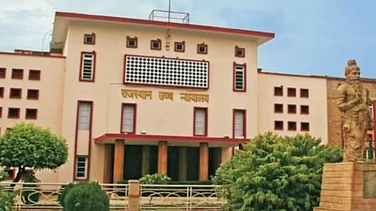It's a total mess. And in its wake, the initiatives by a near-dozen states to introduce technology to make the issuance of driving licences and registration certificates (RC books in common parlance) more secure have been in a limbo. The reason for this chaos is an aggressive, no-holds-barred corporate battle. In the red corner is Smart Chip, whose employees have been accused of issuing fraudulent cards in Gujarat. And in the blue corner is Shonkh Technologies, whose promoter is involved in Department of Revenue Intelligence cases.
Over time, the two have dragged states to courts charging them with favouring competitors, roped in 60-70 MPs to shoot off letters and cajoled global suppliers to lobby on their behalf. After all, the bitter battle is for a Rs 6,000-crore pie, which will grow several-fold if the same technology is adopted in other areas (like the proposed national ID card). Says Shonkh CEO Vivek Nagpal, "It's a case of one firm using all means to delay the entire exercise." Counters a spokesperson of Smart Chip, "Nagpal wants to hijack all the tenders at the expense of a dozen other suppliers."
What has helped the two is the flip-flop by the Centre's transport ministry, moves made by some states to keep out some suppliers and differing judgements by courts. Now, one will have to wait for another clarification from the transport ministry, even as the Supreme Court reviews all contentious issues. Says an official who works with transport minister B.C. Khanduri, "We have received many representations and have set up a committee to look into them. A decision will be taken within weeks."
At the heart of the controversy is the technology to be chosen by the states. Smart Chip makes microprocessor chip-based smart cards and, thus, claims that the Centre, which has the authority to direct states, has favoured this technology through its notifications. Shonkh, which offers smart optical cards, with a chip along with an optical strip, contends that the Centre has left the choice to the states. The fact is that if states float tenders for optical cards, smart-card-makers can't bid for them, and vice versa. Both technologies allow information to be stored in a tamper-proof manner, thereby removing the security concerns regarding frauds and duplications of driving licences and RC books.
What's amazing is the differing ways the rivals interpret rules and affidavits submitted by the transport ministry in courts. Consider the notification issued by the Centre on May 31, 2002, to make it feasible to introduce the new technology. While defining "smart card", it states that it's a "device capable of storing data...which is a single chip microprocessor..." That, says Smart Chip, implies that the Centre never considered the use of optical cards. But then, Nagpal turns to page 23 of the same notification and points out the first line of the proposed Form 23-A which reads, "certificate or registration (in electronic medium as smart card, etc)". The "etc", he says, means the intention was other technologies could also be accepted.
To buttress his claim, Nagpal picks up the affidavit (February 21, 2003) filed by Khanduri's ministry in the Supreme Court. (The ministry is a party in the case filed by UP against the Allahabad High Court order last year that set aside its decision to opt for optical cards.) In the affidavit, the Centre stated it had circulated the "common minimum specifications for smart cards" to states through its two letters in 2001. The word "minimum", says Nagpal, implies use of other technologies.
But then, Smart Chip wants you to read other sentences in the same affidavit: "...it is made out by the petitioners [UP state] that the Apex Committee [on whose recommendations the various rules were drafted by the Centre in 2001 and 2002] had left open the choice of technology from equally preferable technologies [including optical memory]...to the states. It's respectfully submitted that the Apex Committee had considered these technologies but had unequivocally recommended the use of microprocessor chip-based smart card as being the most preferable option..."
So, confusion all around. States like West Bengal and Kerala, which thought central rules permit the introduction of optical cards, have cancelled or withdrawn their tenders. In fact, an official in the West Bengal transport department categorically stated that it has now decided to go in for smart-card technology sans the optical portion. Kerala, says a senior official in its transport ministry, is yet to take a decision in the matter. Gujarat has been forced to make optical cards for RC books as "optional" due to a high court order.
At the same time, there are states like Delhi and UP which feel they have the right to go for optical cards. That's why Delhi's transport department is going ahead with its tender after the Delhi High Court asked it to adhere to central guidelines. And UP has contested the Allahabad High Court's 'no' decision in the Supreme Court. The differing attitudes of the states could lead one to conclude there's excessive lobbying by vested interests.
Coupled with this technology tussle is also the fight over what the states can charge the consumers for issuing the new cards. That's important because the optical cards (around Rs 400 for a car licence) are generally twice as expensive compared to cards based on chips only. Yet again, the states seem to have interpreted the central rules, which are binding on them, in different ways. The May 31, 2002, notification says that the states are allowed to charge an additional amount of Rs 200 per card for the introduction of the new technology. Obviously, this figure is not enough for states that wish to choose the more expensive optical cards.
So, what have they done? To get around this obstacle, states like Maharashtra have issued their own notifications that allow them to charge a higher rates. While admitting it's charging Rs 200 for the card itself, the November 7, 2002, Maharashtra notification stated that an extra Rs 150 will be charged for the optical cards, which needs deployment of manpower by the supplier to maintain the database, infrastructure for setting up online systems and other expenses.
This too has been challenged by the smart-card manufacturers as they feel the extra charge is not allowed as per central laws. Once again, there is a complete lack of clarity here. But bureaucrats in the central transport ministry have on various occasions maintained that the states can "find other legally permissible ways to recover the higher cost, if any, by delinking such recovery from Central Motor Vehicles Rules". But nowhere in official rules or guidelines has this been clarified.
Given the confusion, it's evident that the Centre has to come out with an explanation to sort out the issues. On January 21, 2003, the central ministry did just that by circulating a draft notification. The draft ended with a note: "The above are the minimum specifications.... Any additional memory capacity...or any other information storage technology shall not conflict with the minimum specifications given." That was exactly what Shonkh's Nagpal wanted since it allows for additional memory or storage in the form of an optical strip.
It led to a fresh round of MP letters, bickerings and, obviously, renewed lobbying from the smart-card camp. Now, Khanduri has decided that the matter should be sorted out once and for all. That's why, in true politician style, he has decided to set up yet another committee. One way out for the Centre is to force states to float tenders for both smart cards and optical ones so that no manufacturer is given the short shrift.Still, that's unlikely to solve the problem since optical cards are more expensive and will lose out in any bid. However, if the states are given the option to choose the technology, it will invariably lead to lobbying and more legalese.
Whatever the ministry does, it is unlikely to decide the fate of the two warring competitors. Simply because they have become unstoppable and are even willing to destroy themselves in a bid to merely stop the other.
Chips R Down
The road to hell is paved with good intentions. For proof, look at tech-abled documents.

Chips R Down
Chips R Down
Published At:
MOST POPULAR
WATCH
MORE FROM THE AUTHOR
PHOTOS
×




















